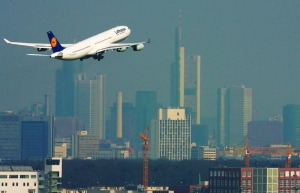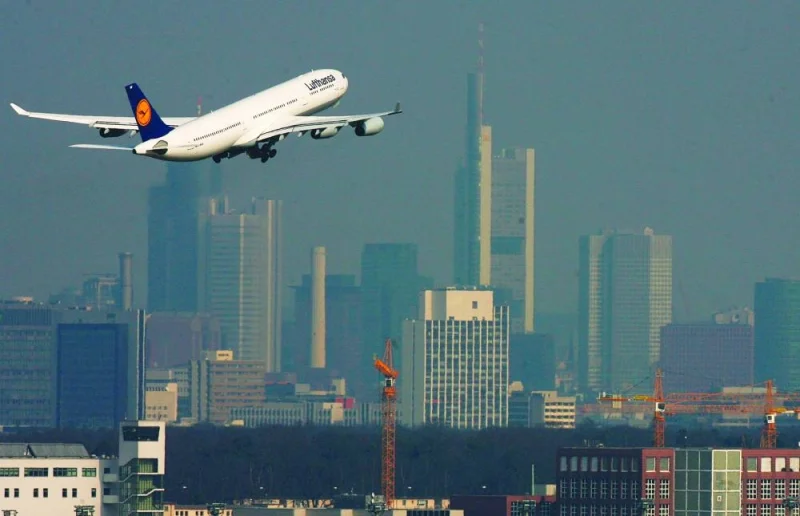Global South
Germany nudges up its growth forecast; ailing economy at ‘turning point’

[ad_1]

A Lufthansa airplane takes off from Frankfurt airport (file). The German government slightly increased its 2024 growth forecast Wednesday, saying there were signs Europe’s beleaguered top economy was at a “turning point” after battling through a period of weakness.
The German government slightly increased its 2024 growth forecast Wednesday, saying there were signs Europe’s beleaguered top economy was at a “turning point” after battling through a period of weakness.
Output is expected to expand 0.3% this year, the economy ministry said, up from a prediction of 0.2% in February.
The slightly rosier picture comes after improvements in key indicators — from factory output to business activity — boosted hopes a recovery may be getting under way.
The German economy shrank slightly last year, hit by soaring inflation, a manufacturing slowdown and weakness in trading partners, and has acted as a major drag on the 20-nation eurozone.
But releasing its latest projections, the economy ministry said in a statement there were growing indications of a “turning point”.
“Signs of an economic upturn have increased significantly, especially in recent weeks,” Economy Minister Robert Habeck said at a press conference.
The ministry also cut its forecast for inflation this year to 2.4%, from a previous prediction of 2.8%, and sees the figure falling below 2% next year.
“The fall in inflation will lead to consumer demand — people have more money in their wallets again, and will spend this money,” said Habeck.
“So purchasing power is increasing, real wages are rising and this will contribute to a domestic economic recovery.” Energy prices — which surged after Russia’s 2022 invasion of Ukraine — had also fallen and supply chain woes had eased, he added.
Several months ago there had been expectations of a strong rebound in 2024, with forecasts of growth above 1%, but these were dialled back at the start of the year as the economy continued to languish.
But improving signs have fuelled hopes the lumbering economy — while not about to break into a sprint — may at least be getting back on its feet.
On Wednesday a closely-watched survey from the Ifo institute showed business sentiment rising for a third consecutive month in April, and more strongly than expected. A key purchasing managers’ index survey this week showed that business activity in Germany had picked up.
And last week the central bank, the Bundesbank, forecast the economy would expand slightly in the first quarter, dodging a recession, after earlier predicting a contraction.
Despite the economy’s improving prospects, growth of 0.3% is still slower than other developed economies and below past rates, and officials fret it is unlikely to pick up fast in the years ahead.
Habeck has repeatedly stressed solutions are needed for deep-rooted problems facing Germany, from an ageing population to labour shortages and a transition towards greener industries that is moving too slowly.
“Germany has fallen behind other countries in terms of competitiveness,” he said. “We still have a lot to do — we have to roll up our sleeves.” Already facing turbulence from pandemic-related supply chain woes, the German economy’s problems deepened dramatically when Russia invaded Ukraine and slashed supplies of gas, hitting the country’s crucial manufacturers hard.
Output is expected to expand 0.3% this year, the economy ministry said, up from a prediction of 0.2% in February.
The slightly rosier picture comes after improvements in key indicators — from factory output to business activity — boosted hopes a recovery may be getting under way.
The German economy shrank slightly last year, hit by soaring inflation, a manufacturing slowdown and weakness in trading partners, and has acted as a major drag on the 20-nation eurozone.
But releasing its latest projections, the economy ministry said in a statement there were growing indications of a “turning point”.
“Signs of an economic upturn have increased significantly, especially in recent weeks,” Economy Minister Robert Habeck said at a press conference.
The ministry also cut its forecast for inflation this year to 2.4%, from a previous prediction of 2.8%, and sees the figure falling below 2% next year.
“The fall in inflation will lead to consumer demand — people have more money in their wallets again, and will spend this money,” said Habeck.
“So purchasing power is increasing, real wages are rising and this will contribute to a domestic economic recovery.” Energy prices — which surged after Russia’s 2022 invasion of Ukraine — had also fallen and supply chain woes had eased, he added.
Several months ago there had been expectations of a strong rebound in 2024, with forecasts of growth above 1%, but these were dialled back at the start of the year as the economy continued to languish.
But improving signs have fuelled hopes the lumbering economy — while not about to break into a sprint — may at least be getting back on its feet.
On Wednesday a closely-watched survey from the Ifo institute showed business sentiment rising for a third consecutive month in April, and more strongly than expected. A key purchasing managers’ index survey this week showed that business activity in Germany had picked up.
And last week the central bank, the Bundesbank, forecast the economy would expand slightly in the first quarter, dodging a recession, after earlier predicting a contraction.
Despite the economy’s improving prospects, growth of 0.3% is still slower than other developed economies and below past rates, and officials fret it is unlikely to pick up fast in the years ahead.
Habeck has repeatedly stressed solutions are needed for deep-rooted problems facing Germany, from an ageing population to labour shortages and a transition towards greener industries that is moving too slowly.
“Germany has fallen behind other countries in terms of competitiveness,” he said. “We still have a lot to do — we have to roll up our sleeves.” Already facing turbulence from pandemic-related supply chain woes, the German economy’s problems deepened dramatically when Russia invaded Ukraine and slashed supplies of gas, hitting the country’s crucial manufacturers hard.
[ad_2]
Source link







